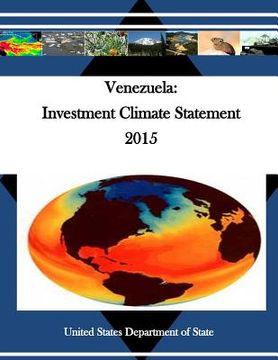Reseña del libro "Venezuela: Investment Climate Statement 2015 (en Inglés)"
Venezuela is located on the northern coast of South America. Political tensions, state interventions in the economy, macroeconomic distortions, physical insecurity, corruption, and a volatile regulatory framework make Venezuela a difficult climate for foreign investors. Conditions for foreign investment are unlikely to improve in the near term. During 2014 the Venezuelan government (GBRV) passed new foreign investment laws that have made the country less hospitable to foreign investors. The falling oil prices, which started in the second quarter of last year, have aggravated Venezuela's economic crisis. Venezuela finished 2014 with an estimated 4 percent economic contraction, 68.4 percent inflation, and widespread shortages of consumer goods. For 2015, the International Monetary Fund (IMF) projects that the economy will shrink another 7 percent, with inflation reaching 80 percent. Financial analysts have raised concerns that strains on Venezuela's USD resources could exacerbate shortages of consumer goods and potentially force a default on its external debt. The energy sector dominates Venezuela's import-dependent economy; the petroleum industry provides roughly 96 percent of export earnings, 40 percent of government revenues, and 11 percent of GDP. Falling petroleum export revenues and a corruption-plagued, mismanaged foreign exchange regime have deprived multinational firms of hard currency to repatriate earnings and import inputs and finished goods. Insufficient access to USD, price controls, and rigid labor regulations have compelled U.S. and multinational firms to reduce or shut down their Venezuelan operations, while high costs for oil production and state oil company Petroleos de Venezuela's (PDVSA) poor cash flow have slowed investment in the petroleum sector. Venezuela has traditionally been a destination for U.S. direct investment, especially in energy and manufacturing, and for exports of U.S. machinery, medical supplies, chemicals, agricultural products, and vehicles. Such investment and trade links have been weakened in recent years by GBRV efforts to build commercial relationships with ideological allies, strained U.S.-Venezuelan relations, and the deteriorating investment climate. Under President Nicolas Maduro, the GBRV's policy response to Venezuela's economic crisis has centered on increasing state control over the economy. President Maduro has used decree powers to pass laws that implement former President Hugo Chavez's Second Socialist Plan for 2013-2019; erode foreign investors' rights; deepen the state's role as the primary buyer and marketer of imports; tighten the currency control regime; and empower the GBRV to cap business profits and regulate prices throughout the economy. The GBRV has promulgated regulations to open a new alternative foreign exchange mechanism for the private sector to buy and sell dollars, including for qualified oil sector inflows, but the new system has attracted limited hard currency in its first months of operation. The GBRV has implemented new laws and regulations to varying degrees, and their staying power remains unproven, increasing uncertainty in the investment climate. U.S. and multinational firms contemplating business in Venezuela should weigh carefully the risks posed by an ongoing economic crisis, a non-transparent and heavily if unevenly regulated operating environment, and a foreign exchange regime that strictly limits access to hard currency.

